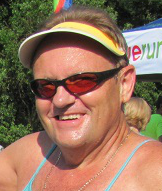With current lifestyles e.g. very intensive training, fussy eaters, fatty diets, vegetarian diets etc. it is essential to have adequate nutritional support to complement the diet of every individual. The digestive system prepares the food we eat for use within the body; vitality is dependent on an active and regular digestive system - for an athlete this ‘petrol tank’ is of utmost importance. For this reason everyone is supplementing their diets with amongst others vitamins, minerals and amino acids. It is true that many of the vitamins and minerals play an important role in metabolism, recovery from exercise and injuries and adaptation by acting as co-factors in important reaction in these processes.
Nutrition experts have set a Recommended Daily Allowance (RDA) for most of the vitamins. A diet that provides less than the RDA for a vitamin is not necessarily deficient in that vitamin because a large safety margin has been set. However, if the diet constantly supplies less than 70% of the RDA, the diet ought to be changed to overcome the deficiency.
Antioxidants are natural substances which act as reducing agents trapping free radicals (which cause cellular damage and aging), thus preventing their harmful effects on the body. Antioxidants have been scientifically proven to lessen muscle tissue damage during exercise and may therefore speed up recovery. It has also been proven that antioxidant supplementation is indispensable for sports people during altitude training.
Eating for recovery is a very important, but often neglected, practice. The body needs two major nutrients after a workout: carbohydrates and protein. Carbohydrates restock fuel stores and protein helps repair any muscle damage. Research indicates that proper nutrition within two hours after an endurance event can greatly enhance recovery. To give the restoration of muscle fuel stores a "kick start", about 1g carbohydrate per kg body weight should be consumed as soon as possible after the training session/competition/heat. The snack (50 - 100g) can be in liquid or solid form and should be repeated every two hours until you eat your first mixed meal.
Examples of 50g carbohydrate snacks (Burke, 1998)
- 250ml of a carbo-loader supplement
- 250 - 300ml of a liquid meal supplement
- 800 - 1000ml of a sports drink
- 50g packet of jelly beans or boiled sweets
- Three medium pieces of fruit
- A large Bar One
- One sports bar
Rest enhances the recovery process, reduces risk of injury, and invests in future performance. To replace depleted glycogen stores completely, the muscles may need several days of rest with no exercise and a high-carbohydrate diet. So do the right thing and rest, you sure earned it!
References:
Burke L. 1998. Food for sports performance – peak nutrition for your sport. 2nd ed. Australia: Allen & Unwin.


 RSS Feed
RSS Feed